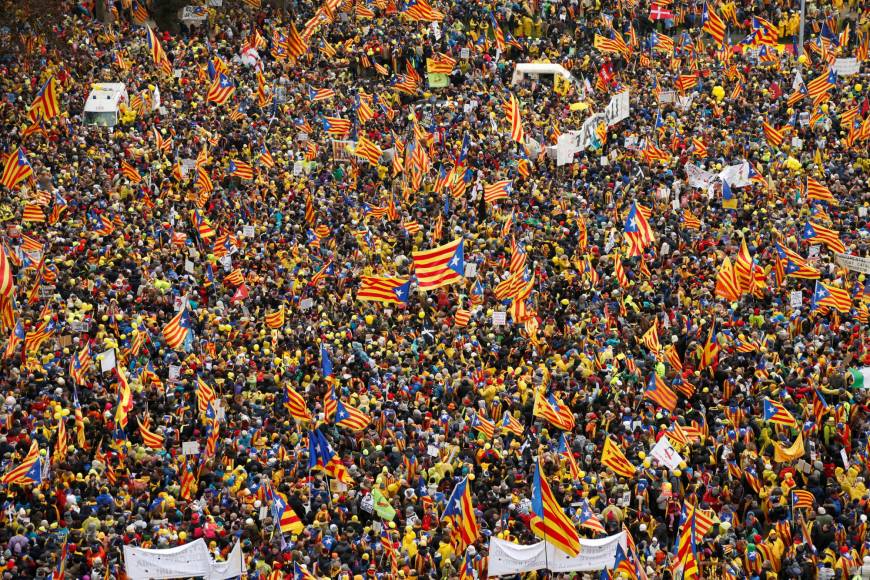BRUSSELS BEHIND THE SCENES
Weekly analysis and untold stories
With SAMUEL STOLTON
Last week on Brussels behind the scenes: Call me Boris
Tears for Catalonia
Meritxell Serret is in exile. We sit opposite one another around a circular wooden table in her office at the Catalan delegation to the EU situated at Rue de la Loi. It is evening and outside the lugubrious Brussels skies wilt over the city, plumped for the onset of rainfall.
Serret is the Catalan Government Representative to the EU. The cadence of her voice is mild, and she speaks with an air of peaceful resolve – an attempt, perhaps, to preserve a sense of control amid an increasingly perilous time for Catalan separatists. Earlier in October, nine Catalan politicians and activists were sentenced to imprisonment in Spain for their roles in the independence referendum on 1 October, 2017, which had been deemed illegal by the Constitutional Court. Ninety percent of voters who participated supported the separatist position. Catalonia unilaterally declared independence on 27 October, 2017.
Sent out every Friday afternoon, BRUSSELS BEHIND THE SCENES brings the untold stories about the characters driving the policies which affect our lives. Analysis not found anywhere else, The Brussels Times' Samuel Stolton helps you make sense of what is happening in Brussels.
If you want to receive Brussels behind the scenes straight to your inbox every Friday, subscribe to the newsletter here.
“I’m here by accident,” she tells me. “I had never expected to be in this position.” Outside, globules of purple rain start to pattern the windows and Serret steals a glance at the building opposite - the European External Action Service. Later this year, Spanish Foreign Minister Josep Borrell is set to take up his seat at the top of the table at this Commission branch. He is a staunch opponent of the Catalan independence movement. “I’m trying to overcome the limits of exile and repression,” she adds.
Serret cannot return to Spain, for now. She is reportedly wanted on a charge of disobedience, an accusation that would normally not merit the issuing of a European Arrest Warrant. However, last week, Spain's Supreme Court prosecutor applied for international arrest warrants for the Catalan officials Toni Comín, Lluís Puig and Clara Ponsatí – the first two of whom are based in Belgium, while Ponsatí is currently in Scotland. They are wanted on allegations of sedition and the misuse of public funds.
The former President of Catalonia, Carles Puigdemont, has the highest profile of the exiled officials, and is currently holed up at ‘la Casa de la Republica’ in Waterloo, on the outskirts of Brussels. An international warrant was reissued for his arrest in mid-October, and a Belgium court recently adjourned his case until 16 December. On Wednesday, his father, Xavier Puigdemont, passed away in Catalonia at the age of 91. Carles will not be able to return to Spain to attend the funeral.
For Serret, going back to Spain is a risk not worth taking, despite the difficulty of leaving loved ones behind. She escaped to Brussels in the aftermath of the October 2017 referendum. She is in Brussels alone, without any family.
“I am not going to give them a chance to do what I believe is unjust,” she says. “I will always defend what I believe is fair. Organising a referendum is not a crime, according to the Spanish Penal Code.” Her soft voice warmly decorates the harshness of the room – this office is cold, sterile, overly clean. There is a large Catalan flag standing in the corner – the red and yellow colours alarm the mute emptiness of the office in a serene, silent petrification: a voiceless scream.
BRUSSELS BEHIND THE SCENES POWERED THIS WEEK BY
“I am fighting for the values of Europe – integration, unity, diversity – these are also the principles of a free and independent Catalonia. The European institutions act as guarantors of these freedoms,” Serret tells me, when I ask her who she is doing all this for, having sacrificed so much for the mirthless mope of the Belgian climate.
Tears begin to bud from Serret’s eyes. The alternative, she says, does not bear thinking about. “To permit attitudes that support the imprisonment of democrats and the repression of our political movement is much worse. In Spain, this is too recent in our history to forget.”
The country’s Francoist dictatorship lasted until 1975, when Franco died. Unlike its neighbour Portugal, which had overcome its own authoritarian regime, the Estado Novo, by way of a military uprising in 1974, Spain’s brand of fascism had not been severed so abruptly, but had rather ‘dissolved’ when Franco passed away and King Juan Carlos I led the gradual transition to democracy.
“I have always hoped that the Spanish government would agree to talk to us, to engage in a debate and appreciate that there is a political conflict that requires a political solution. I still believe that we share values with one another,” Serret says.
For his part, Spain’s current Prime Minister, Pedro Sanchez, has been unwilling to talk. This Sunday, his party, the Spanish Socialists, will emerge with the most seats in the country’s general election – they will however still be short of the required majority and may look to form pacts with Ciudadanos or the PP, in order to establish a government.
Last week, during a dinner with Spanish diplomats in Brussels and naively assuming that the Catalan quandary could be a stimulating conversation topic, I allotted the subject into our discussion. Indeed it was, but not in the manner I had expected –yielding instead a wild and flippant response. “The media has got it all wrong,” one diplomat said. “The separatists are fanatic extremists – they are radicals.”
Talking to Serret, this portrayal is difficult to fathom. With a burdensome sigh, she starts sketching small arrows on a notepad in front of her – they signal movement, progress, development, change. “Catalan society is on the side of dialogue, of finding a political solution,” she says. “It’s getting hard, but we will not give up.”
Sent out every Friday afternoon, BRUSSELS BEHIND THE SCENES brings the untold stories about the characters driving the policies which affect our lives. Analysis not found anywhere else, The Brussels Times' Samuel Stolton helps you make sense of what is happening in Brussels.
If you want to receive Brussels behind the scenes straight to your inbox every Friday, subscribe to the newsletter here.


